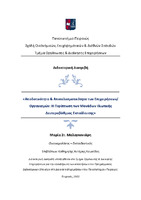Αποδοτικότητα & αποτελεσματικότητα των επιχειρήσεων / οργανισμών: η περίπτωση των μονάδων ιδιωτικής δευτεροβάθμιας εκπαίδευσης

Προβολή/
Λέξεις κλειδιά
Αποτελεσματικότητα ; Αποδοτικότητα ; Ιδιωτική εκπαίδευση ; Δευτεροβάθμια εκπαίδευσηΠερίληψη
Είναι γεγονός ότι η εκπαίδευση διαδραματίζει κυρίαρχο ρόλο σε προσωπικό, κοινωνικό και οικονομικό επίπεδο. Η παρεχόμενη εκπαίδευση μίας χώρας στηρίζεται εν πολλοίς στην οργάνωση και τη διοίκηση των εκπαιδευτικών μονάδων (educational management), οι οποίες στην προσπάθειά τους να ανταποκριθούν στις απαιτήσεις της σύγχρονης κοινωνίας, καλούνται να παρακολουθούν και να μετρούν περιοδικά την αποδοτικότητα, την αποτελεσματικότητα, την παραγωγικότητά τους καθώς και άλλους συναφείς δείκτες απόδοσης.
Κατά κανόνα, η «δια βίου» εκπαίδευση των διευθυντών, ως επικεφαλής, και των εκπαιδευτικών συνεπάγεται τη διαρκή βελτίωση των οργανισμών/ επιχειρήσεων, δηλαδή των ιδιωτικών εκπαιδευτικών μονάδων εν συνόλω. Με βάση αυτό, αντικείμενο της παρούσας διδακτορικής διατριβής είναι η διερεύνηση των παραγόντων που προσδιορίζουν την αποδοτικότητα και την αποτελεσματικότητα των επιχειρήσεων/ οργανισμών στον τομέα της εκπαίδευσης. Πιο συγκεκριμένα, επειδή ένας εκ των κυρίων στόχων της εκπαίδευσης είναι να συμβάλλει στην ολόπλευρη, αρμονική κι ισόρροπη ανάπτυξη των διανοητικών και ψυχοσωματικών λειτουργιών των εκπαιδευόμενων, κρίνονται ως απαραίτητα προαπαιτούμενα η ορθή διοίκηση κι ο συντονισμός των πόρων (ανθρώπινων, υλικών, τεχνικών) και των λειτουργιών που υποστηρίζουν την εκπαιδευτική διαδικασία με αποτελεσματικό τρόπο.
Πιο αναλυτικά, στο πρώτο κεφάλαιο γίνεται μία σύντομη ανασκόπηση της ιστορίας της νεοελληνικής εκπαίδευσης, παρουσιάζονται ο τρόπος ίδρυσης και η λειτουργία, η διάρθρωση, η οργάνωση κι η διοίκηση των μονάδων δευτεροβάθμιας εκπαίδευσης (Γενικά Λύκεια), δίνοντας έμφαση σε αυτές του ιδιωτικού τομέα, σύμφωνα με την κείμενη νομοθεσία, καθώς και τελευταία στατιστικά στοιχεία και δεδομένα γι’ αυτή.
Στο δεύτερο κεφάλαιο παρουσιάζεται η συστημική προσέγγιση της λειτουργίας της εκπαιδευτικής μονάδας, αναλύονται τόσο το εξωτερικό όσο και το εσωτερικό περιβάλλον της, σύμφωνα με τις αρχές του στρατηγικού management και στη συνέχεια, προβάλλονται μέσα/μέθοδοι τόσο οργάνωσης όσο και διοίκησής της, σύμφωνα με τις επιταγές της εκπαιδευτικής διοίκησης. Στη συνέχεια, αναλύεται η εκπαίδευση ως υπηρεσία και προβάλλονται τα βασικά χαρακτηριστικά της, οι αρχές κι οι διαστάσεις της ποιότητά της, τα οφέλη και τα εμπόδια από την εφαρμογή ποιότητας, η έννοια της Διοίκησης Ολικής Ποιότητας (Total Quality Management). Τέλος, το κεφάλαιο ολοκληρώνεται με τον αξιοσημείωτο ρόλο του διευθυντή (ηγέτη) στην εκπαιδευτική μονάδα και τον παράγοντα καταλυτικής σημασίας για την ποιοτική λειτουργία της: την κουλούρα.
Στο τρίτο κεφάλαιο παρουσιάζονται οι έννοιες, τα είδη, τα μοντέλα και οι τρόποι μέτρησης της αποδοτικότητας (efficiency), της αποτελεσματικότητας (effectiveness) και της παραγωγικότητας (productivity). Στη συνέχεια, προβάλλεται η σχέση μεταξύ αυτών των τριών εννοιών στο πλαίσιο μίας εκπαιδευτικής μονάδας. Τέλος, αναφέρονται η έννοια, τα εργαλεία και οι δείκτες της οργανωσιακής απόδοσης.
Στο τέταρτο κεφάλαιο γίνεται μία σύντομη παρουσίαση της (ποσοτικής) έρευνας στις κοινωνικές επιστήμες και πιο συγκεκριμένα, στο τομέα της εκπαίδευσης, καθώς στη συνέχεια, καταγράφονται τα στοιχεία περί της μεθοδολογίας και του σχεδιασμού της παρούσας έρευνας, δηλαδή ο πληθυσμός, τα ερευνητικά ερωτήματα, το όργανο μέτρησης κι οι έλεγχοι αξιοπιστίας και εγκυρότητάς του, τα θέματα έρευνας κι οι θεματικές ενότητές της, η μέθοδος συλλογής των δεδομένων, το ποσοστό απόκρισης και η μέθοδος ανάλυσης των δεδομένων.
Στο πέμπτο κεφάλαιο παρουσιάζονται η ανάλυση των δημογραφικών χαρακτηριστικών των συμμετεχόντων (διευθυντών), του Λυκείου που υπηρετούν, του μαθητικού κοινού και του διδακτικού και διοικητικού προσωπικού κατά τη διάρκεια της εξεταζόμενης σχολικής χρονιάς. Στη συνέχεια, ακολουθούν κατανομές συχνοτήτων των εξεταζόμενων μεταβλητών ανά θεματική ενότητα: οργάνωση και διοίκηση, τυπική αξιολόγηση διδακτικού προσωπικού, σχολικό κλίμα, ένταξη και καθοδήγηση, διαφορετικότητα, επαγγελματική ικανοποίηση. Έπειτα, προβάλλονται οι απαντήσεις των συμμετεχόντων σχετικά με την αποτελεσματικότητα του σχολείου και την επιρροή από την πανδημία του COVID-19. Τέλος, γίνονται συσχετίσεις μεταξύ των ερωτημάτων προκειμένου να απαντηθούν τα ερευνητικά ερωτήματα και προβάλλεται Πίνακας με την ανάλυση των δεικτών – μ.ο. εκπαιδευτικών μονάδων βάσει των στατιστικών δεδομένων.
Έτσι, στο τέλος παρουσιάζονται τα συμπεράσματα και η ερμηνεία των αποτελεσμάτων, οι περιορισμοί και οι προτάσεις για περαιτέρω έρευνα. Τα βασικά συμπεράσματα της διδακτορικής διατριβής στηρίζονται από μεθοδολογική άποψη στη διερεύνηση της υφιστάμενης κατάστασης, στην επισκόπηση της σχετικής βιβλιογραφίας και στα αποτελέσματα της πρωτογενούς έρευνας που στοχεύουν στην καταγραφή των παραγόντων που επηρεάζουν την αποτελεσματικότητα και την αποδοτικότητα των μονάδων ιδιωτικής δευτεροβάθμιας εκπαίδευσης και πιο συγκεκριμένα, των Γενικών Λυκείων της Ελλάδας.


